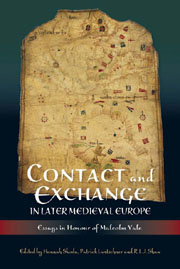Book contents
- Frontmatter
- Contents
- List of Illustrations
- List of Contributors
- Acknowledgements
- The Work of Malcolm Vale
- Principal Bibliography of Malcolm Vale
- Introduction
- Part I Boundaries and Units
- Introduction
- Economic Development, Social Space and Political Power in Bruges, c. 1127–1302
- Flemings in the Peasants' Revolt, 1381
- Does a Common Language Mean a Shared Allegiance? Language, Identity, Geography and their Links with Polities: The Cases of Gascony and Brittany
- Revisiting the Political Uses of Vernacular Language in Portugal during the Thirteenth Century: On Models, Motives and Modes
- Scotland in the Later Middle Ages: A Province or a Foreign Kingdom for the English?
- The Angevin Legacy, Dynastic Rivalry and the Aftermath of the Hundred Years War, 1453–1491
- Part II Practices of Exchange
- Conclusions
- Index
- Tabula Gratulatoria
The Angevin Legacy, Dynastic Rivalry and the Aftermath of the Hundred Years War, 1453–1491
from Part I - Boundaries and Units
Published online by Cambridge University Press: 05 February 2013
- Frontmatter
- Contents
- List of Illustrations
- List of Contributors
- Acknowledgements
- The Work of Malcolm Vale
- Principal Bibliography of Malcolm Vale
- Introduction
- Part I Boundaries and Units
- Introduction
- Economic Development, Social Space and Political Power in Bruges, c. 1127–1302
- Flemings in the Peasants' Revolt, 1381
- Does a Common Language Mean a Shared Allegiance? Language, Identity, Geography and their Links with Polities: The Cases of Gascony and Brittany
- Revisiting the Political Uses of Vernacular Language in Portugal during the Thirteenth Century: On Models, Motives and Modes
- Scotland in the Later Middle Ages: A Province or a Foreign Kingdom for the English?
- The Angevin Legacy, Dynastic Rivalry and the Aftermath of the Hundred Years War, 1453–1491
- Part II Practices of Exchange
- Conclusions
- Index
- Tabula Gratulatoria
Summary
Malcolm Vale, in the concluding paragraphs of The Angevin Legacy, his masterly analysis of the origins of the Hundred Years War, has written that ‘if Anglo-French rivalry over the sovereignty of Aquitaine was a major cause of sustained conflict [as he has argued it was] then there is a clear line of continuity from Edward I's war through Edward III's successes to Henry VI's defeat’. Edward I's lawyer diplomats in the 1290s were vigorously asserting the allodial status of the duchy and its independence from the French crown. Edward III, in the terms that he accepted at Brétigny in 1360, made it clear that his claim to the sovereignty of Aquitaine mattered to him more deeply and above his claim to the French throne. The retention of a sovereign duchy of Aquitaine, now coupled with the duchy of Normandy, was still the first priority of English diplomacy in Henry VI's time, as witnessed in exchanges with the French in the 1440s. The notion that the Plantagenets had a continental role to play was ‘firmly embedded in their minds’ in the age of the first three Edwards; it remained embedded there still in the fifteenth century. Even after 1453 and the French annexation of Gascony, when there was nothing left of the English kings' possessions in France outside Calais and its march, English territorial claims and English alliances of interest with parties on the French side of the Channel dating back to the twelfth-century days of the Angevin empire remained crucial to the relations of the English Plantagenets with the royal house of France.
- Type
- Chapter
- Information
- Contact and Exchange in Later Medieval EuropeEssays in Honour of Malcolm Vale, pp. 145 - 158Publisher: Boydell & BrewerPrint publication year: 2012

